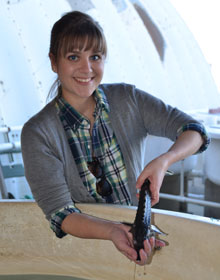
Jamilynn Poletto, assistant professor within the School of Natural Resources, had an unusual beginning to her career.
While completing her bachelor’s degree in neuroscience at the University of Rochester, she took a neuroethology class that looked at the neural basis for naturally occurring animal behavior.
“It was one of those ‘aha’ moments where I said, ‘I love this’,” she said. “‘I don’t want to go to med school; I want to go to grad school.’”
She went on to get her doctorate in animal behavior at the University of California, Davis. Her post doctorate position focused on how temperature affects the metabolic rate of the green sturgeon in California.
In 2016, she joined SNR at the University of Nebraska-Lincoln as a fish physiologist because she fell in love with the department and environment. She grew up in a small town in upstate New York and found that the comradery, open-door policy, and great working environment within SNR made Lincoln feel like a small town as well.
“There’s lots of opportunities here for interesting fish work,” Poletto said. “The fish diversity afforded meaningful work.”
Poletto teaches ichthyology, ecophysiology of wildlife and graduate seminars. For her research, she focuses on integrating studies of behavior and physiology of endangered fishes with conservation and management plans. Using this information, she can make more effective management plans.
In the field, researchers find that stressors such as habitat fragmentation, water temperatures, or invasive species may cause the decline in fish populations. Poletto wants to figure out the exact stressor causing a specific fish decline.
“In order to correct the problem or mitigate it, we need to know what the actual corresponding link is,” she said. “I link some sort of environmental stressor to the behavior change.”
She also works on collaborative projects with others in SNR examining how climate change, coupled with humans, affect natural ecosystems. And, she is studying fish populations in Canada to try to explain why some populations in one part of the world may be doing better than other populations.
Poletto said she is always willing to take on students for research projects, and she hires undergrads during the summer time to take care of fish in her lab. She encourages students to volunteer with her.
“I love to give students the opportunity to develop their own research and gain a lot of work experience so they’re prepared to enter the work field,” she said.
In the future, Poletto said she would like to continue to grow a strong research team in fish physiology and collaborate more with other SNR faculty.
Alli Dickey, Natural Resources communications assistant
More details at: https://go.unl.edu/fepe